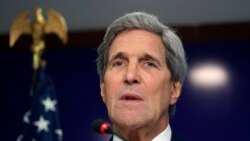Since the beginning of this century, trade and the broader economic relationship between the United States and India have been growing by leaps and bounds. Trade has grown five-fold. In addition, bilateral direct investment stands at nearly $35 billion, supporting hundreds of thousands of jobs in both countries. But “we can do more together, and we must do more together, and we have to do it faster,” said Secretary of State John Kerry at the opening ceremony of India’s Vibrant Gujarat Summit:
“We share Prime Minister [Narendra] Modi’s goal of increasing our countries’ annual trade fivefold in the years ahead, and we want to expand our commercial ties and change the way our businesses talk with one another so we can take this relationship, and these relationships is plural, to the new heights that we envision.”
Last year, soon after the Indian people elected him to be their leader, Prime Minister Modi identified some of his government’s key priorities. These include improving India’s infrastructure and domestic manufacturing base, promoting energy security and increasing foreign investment, and expanding India’s strategic role in its immediate neighborhood and across the Indo-Pacific region. To that end, Prime Minister Modi has taken a number of concrete steps to improve the business climate in India for both Indian and foreign companies. These include easing barriers to investment in insurance, in defense, and in medical equipment; announcing land reform; eliminating red tape; and working toward replacing indirect taxes levied on goods and services with a goods and services tax.
The United States and India are also working on agreements that could help to resolve some of India’s more pressing issues, such as infrastructure improvement, nuclear power generation, better access to clean water, and improved rural electrification.
“If we work together,” said Secretary of State Kerry, “I am convinced that the world’s oldest democracy and the world’s largest democracy can help to forge a new era of shared possibility and security for hundreds of millions of people in India, but indeed, across Asia, and across the world,” he said. “We could end extreme poverty in our lifetimes.”






